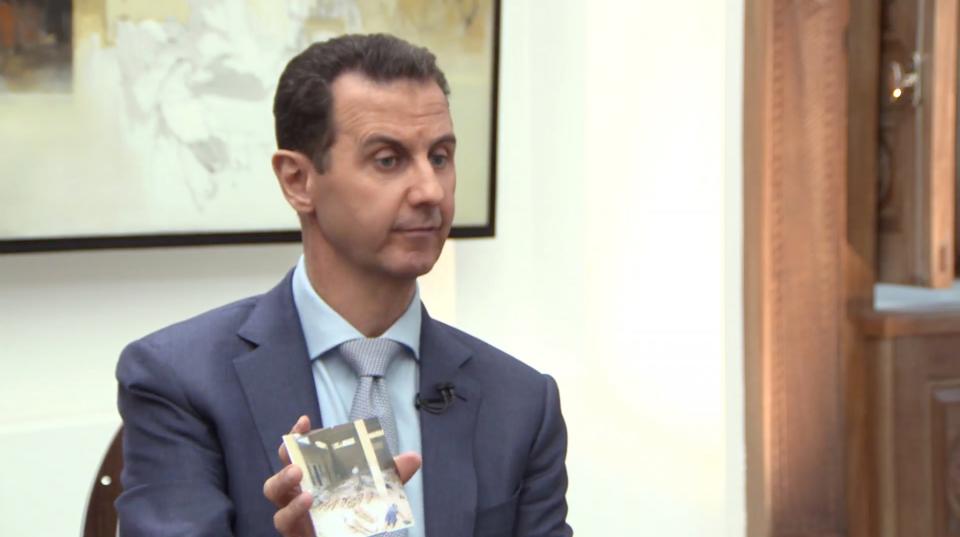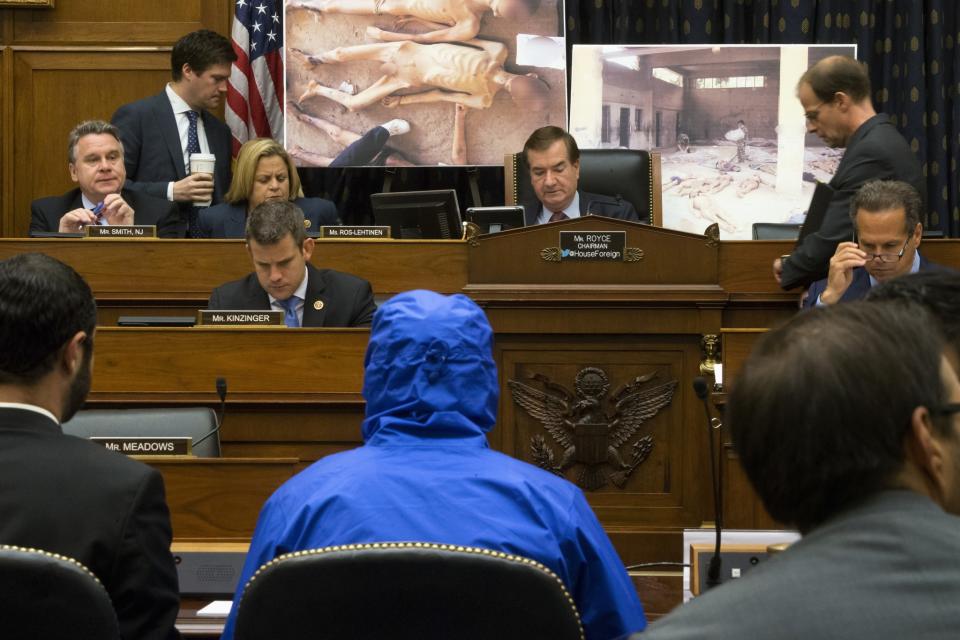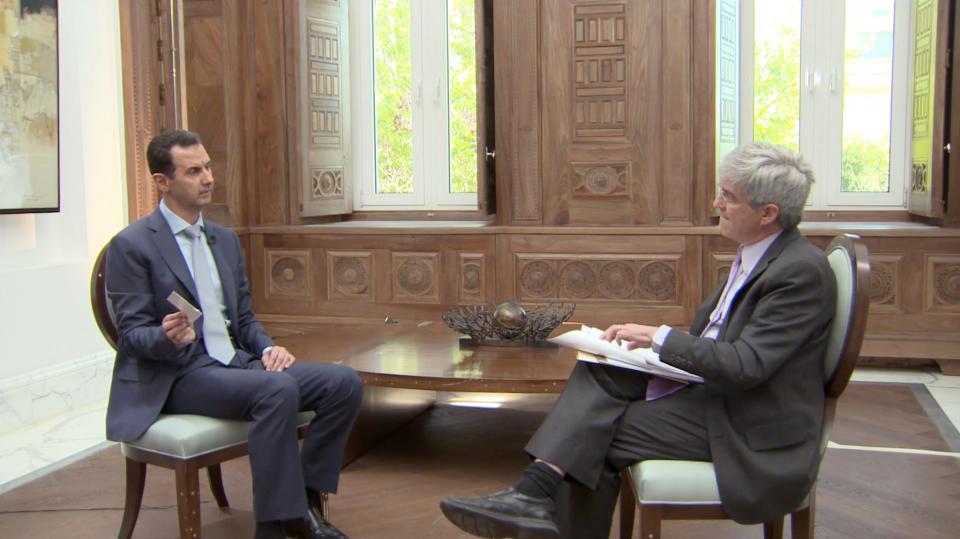EXCLUSIVE: Defiant Assad tells Yahoo News torture report is 'fake news'
DAMASCUS – Confronted with new evidence of torture and mass hangings in one of his military prisons, Syrian President Bashar Assad said in an exclusive interview with Yahoo News that the allegations were the product of a “fake news era” and charged that a human rights group, Amnesty International, had fabricated evidence to discredit his embattled government.
“You can forge anything these days,” Assad said when asked about a new Amnesty International report estimating that between 5,000 and 13,000 prisoners were killed in a “calculated campaign of extrajudicial execution” at a military prison outside of Damascus between 2011 and December 2015. “We are living in a fake news era.”
[ Watch: Yahoo News’ full interview with President Assad ]
Assad, combative and unyielding, also insisted the United States had no grounds to condemn Syria for human rights abuses, pointing to the invasion of Iraq and to American support for Saudi Arabia, a country that beheads prisoners. “The United States is in no position to talk about human rights,” he said. Challenged over the issue, Assad grew contentious, saying at one point, “You own the questions. I own the answers.”
The Syrian president was also confronted for the first time with chilling photographs taken by a former regime photographer, code named Caesar, depicting rows of emaciated, brutally beaten bodies of detainees — many of them believed to be political protesters — at his military prisons. The photographs — which U.S. officials have likened to images from Nazi concentration camps — were the basis for a landmark lawsuit filed in Spain’s National Court last week accusing nine senior Syrian intelligence and security officials of international human rights crimes.

Assad at first suggested the photos may have been edited and “Photoshopped.” Shown an FBI report concluding that the photos were not manipulated and appeared to depict “real people and events,” Assad dismissed it. “If the FBI say something, it’s not evidence for anyone, especially for us,” he said. “The most important thing: If you take these photos to any court in our country, could they convict any criminal regarding this? Could they tell you what this crime is, who committed it? If you don’t have this full picture, you cannot make judgment. It’s just propaganda.”
Assad made the comments during a 34-minute interview, his first since the inauguration of Donald Trump — recorded by five presidential cameramen in one of his offices in Damascus. It comes at a pivotal moment in Syria’s six-year-long civil war. Assad — after years of resisting U.S. pressure to step down — has become increasingly emboldened in the wake of military gains, including the recapture of eastern Aleppo, with the help of Russian air strikes. Assad pointed to the slow restoration of civilian life in Damascus, where the streets are bustling and shops in the old city souk are jammed with customers — albeit with military troops and checkpoints throughout the city and the booms of occasional mortar fire in the suburbs still audible in the evenings.
“As you can see, Damascus is safe today — it’s nearly normal life, not completely,” he said.
Assad warned the Trump administration about placing new troops inside Syria to fight the Islamic State without his approval and rejected an idea advocated by Trump for “safe zones” in his country. The proposal, he said, was “not a realistic idea at all.” He did hold out hope for cooperation with the Trump administration, but only following “a rapprochement between the Russians and Americans.”
Assad also appeared to lend support to one of the Trump administration’s arguments for its controversial executive order suspending the settlement of Syrian refugees in the United States and temporarily banning the entry of any citizens from Syria and six other predominantly Muslim countries. There were, Assad said, “definitely” terrorist sympathizers embedded among Syria’s 4.8 million refugees. He cited photographs showing Syrian rebels, “holding the machine gun or killing people,” who later resurfaced in Western Europe. Asked if he believed there were a “significant” number of terrorists among the Syrian refugee population, he responded, “It’s not about significant, because you don’t need a significant number to commit atrocities.” While he said it was not his place to weigh in on the domestic U.S. debate over the executive order, Assad said his priority was to encourage refugees to return to Syria.

In Assad’s account, Syria’s civil conflict — which American officials blame on his brutal suppression of protests during the Arab Spring demonstrations of 2011 — resulted from American and Saudi support for a rebellion that was hijacked by Islamic extremists. “So, who supported ISIS?” he asked. “We didn’t create it. You created it — the United States created all this mess. Who supported the rebels and called them ‘moderate rebels’ while they became ISIS and al-Nusra in Syria? We didn’t. So, it’s not a conspiracy. These are facts, this is reality.”
He was dismissive of U.S. efforts to combat ISIS in Iraq and Syria. “This is a cosmetic campaign against ISIS,” he said. The terror group’s advances weren’t halted, he said, until his ally, Russia, entered the conflict with its own aerial bombing campaign. “It [ISIS] started shrinking after the Russian intervention, not the American one,” Assad said. “How could they use our oil fields and export with thousands of … trucks to Turkey without being seen by your drones and by our satellites while the Russians could be able to do so and attack them and destroy them?” Assad acknowledged he is in frequent contact with his Russian allies, including talking to President Vladimir Putin “a few weeks ago” about the “advancement of the Syrian army in Syria.”
While he has had no communications with the new U.S. president, Assad said he finds Trump’s public comments about fighting terrorism “promising.” But any prospect that the U.S. might work with Assad’s government is complicated by persistent reports of human rights abuses, including the damning new Amnesty International report. The report on the Saydnaya military prison — entitled “Human Slaughterhouse” — described how prisoners, some of them political opponents of Assad’s government, were sentenced to death in secret military trials that lasted one to three minutes. The condemned prisoners were blindfolded and taken in the middle of the night to a basement, where they were hanged 20 to 50 at a time, and their bodies were then dumped in mass graves, Amnesty International charged. The report was based on interviews with 84 people, including 31 former detainees at the prison, four prison officials or guards, three former Syrian judges and three doctors who worked at a military hospital.

Assad claimed there was not a “shred of evidence” for the report. Told that it was based in part on interviews with former Syrian prison officials and guards, judges and doctors, Assad replied, “It means nothing. … When you need to make a report, you need concrete evidence. You can make any report. You can pay money to anyone like Qatar did last year. They paid money for such a report, and they brought their own witnesses, and they made a report.”
“Do you know what goes on in that prison? Have you been there?”
“No, I haven’t been. I’ve been in the presidential palace, not in the prison.”
The Syrian president defended the execution of prisoners as “part of the Syrian law.” Asked if secret trials with no lawyers present was also part of Syrian law, he answered: “Why do they need it, if they can make it legally.”
Assad has admitted that his troops have made “mistakes” in pursuing his campaign against rebels, saying “there are always mistakes in any action.” But he vigorously denied that his forces have bombed hospitals in Aleppo.
“Why to bomb a hospital? Can you convince your audience that we have interest in bombing hospitals? … The proof that it was a lie, every time they talk about bombing hospitals, every time they say this is the last hospital in eastern part of Aleppo, and the second time they talk about another hospital and they say the same ‘they bombed the last hospital.’
“So it’s lies and lies and lies.”
_____
As with all interviews granted by President Bashar Assad, this interview was filmed by his presidential press office. No editorial changes were made to the content.
Full interview
Read more from the Yahoo News Exclusive interview with Syrian President Assad:
Exclusive: Syria’s Assad rejects Trump’s call for ‘safe zones’
Exclusive: Syria’s president said he would ‘welcome’ American troops into his country to fight ISIS
Exclusive: Assad is confronted with photos of his torture victims
Exclusive: Assad of Syria says he would step down ‘if there is public consensus’

 Yahoo News
Yahoo News 


